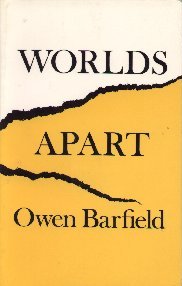
Blake

Newton

| Logomorphism |
"The world-picture of modern science," as Sanderson explains in Worlds Apart, "is a fallacy, if we project it back into the past; and if we try to fix it for the future" (WA 134). Logomorphism leads to all sorts of absurdities, of which Barfield took note throughout his career. In the book in which he first coined the term (Poetic Diction [1928]), Barfield discovers our thinking about the mythic to be logomorphic.
In Worlds Apart, it is the work of a contemporary scientist that is guilty of logomorphism. There, Burgeon asks incredulously,The remoter ancestors of Homer, we are given to understand, observing that it was darker in winter than in summer, immediately decided that there must be some "cause" for this "phenomenon," and had no difficulty in tossing off the "theory" of, Demeter and Persephone, to account for it. . . Imagination, history, bare common sense--these it seems, are as nothing beside the paramount necessity that the great Mumbo Jumbo, the patent double-million magnifying Inductive Method, should be allowed to continue contemplating its own ideal reflection--a golden age in which every man was his own Newton, in a world dripping with apples. (PD 90)
In the following exchange (also from Worlds Apart), Burgeon dismantles, with Socratic panache, the logomorphic thinking of the physicist Brodie, reducing it to absurdity:How could the chap [biologist J. Z. Young] who delivered the Reith lectures a few years ago--Doubt and Certainty in Science, I think they were called--talk in one lecture about "a man-world of observers and the relations between them" and tell us to remember that our favourite "real" world was only invented in the seventeenth century--and then fill the very next lecture with descriptions of the world as it was before man existed? What world did he think he was talking about? The one that that was invented in the seventeenth century, or some other? (WA 55-56)
[Burgeon]. I wonder if I have really understood what you mean by primary and secondary qualities. I have been assuming that in place of "primary qualities" we could equally well say "the fact of the matter" or "external reality" or something like that and vice versa, but that in the case of the secondary qualities, though we do not hold them to be unreal, we could not do that because they are also appearances or semblances depending on the senses and the mind or brain of man.
- [Brodie]. Yes, that is quite right.
[Burgeon]. Then I repeat that it must have been a great hardship for these learned men that, just about the time when the frontiers of time were burst through and they might have started writing histories of this solid earth and of the solid plants and animals on it and so forth with all their different colours and shapes and other qualities--histories extending back for millions of years instead of only a few thousands--all this great enterprise had to be abandoned.
[Brodie]. Why should it be abandoned?
[Burgeon]. Because henceforth it seems that any history of such things must either be a history of numbers, or quantities, or something of that sort, or else it must largely be a history of men's minds and eyes and their other senses. Whereas if, for example, solidity had not been discovered to be secondary quality, very learned and exciting accounts could have been given of a solid earth and solid rocks and plants and animals and so forth on its surface, as they were millions of years before men and their minds were generated from them.
[Brodie]. You say many such accounts could have been given; but many have been given and they are still being given. Masses of evidence have been accumulated and only the details of it are in dispute.
[Burgeon]. I see. I suppose, then, that this evidence comes to us in some other way than through our senses and our minds. . . . I am just wondering what your opinion is about those men who knowing, not through their unaided senses but with the help of microscopes and other precision instruments, all about the difference between the primary qualities and the secondary qualities of the earth, nevertheless account for those secondary qualities by showing how they came into being before any minds or senses existed. (77, 79)
There is a simple cure for logomorphic thinking,
however: the "realization of how much younger is the Tree of Knowledge
than the Tree of Life" (PD 90). With that realization comes a true
understanding of the evolution of consciousness.
| See in particular Poetic Diction, passim, Worlds Apart, pp. 64-87. |